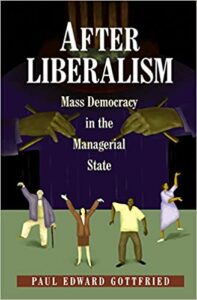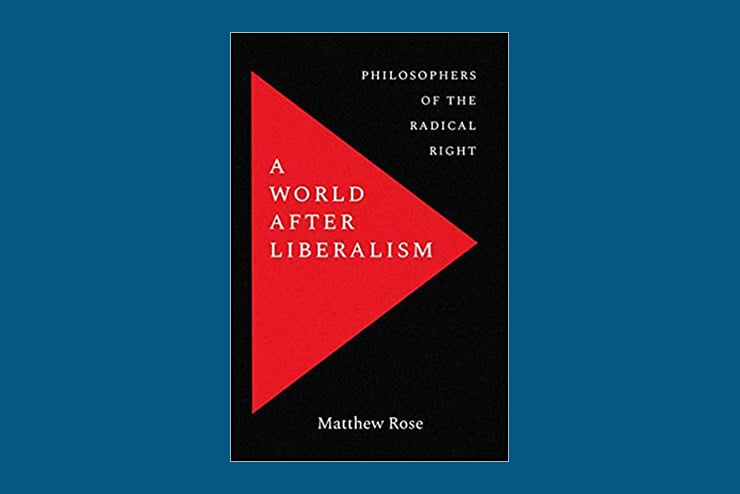
A World After Liberalism: Philosophers of the Radical Right
by Matthew Rose
Yale University Press
208 pp., $28.00
This is a book with a touchingly familiar ring. Traces of my own published works abound in Matthew Rose’s exploration of “radical right” thinkers. His manifest borrowings would include the title of my 1999 book, After Liberalism, and my extensive treatment of interwar figures of the European right, including my widely circulated biography of Carl Schmitt. Clearly Rose has studied my oeuvre but chosen for his own reasons not to mention it.
The unacknowledged debt aside, there is a deeper problem in the cautionary attitude with which Rose approaches his subjects. We should keep in mind that he is revisiting figures who no longer resonate in our political culture. Unlike Rose, I can’t even imagine our post-liberal Western society falling into the hands of someone as unconventionally right-wing as Francis Yockey or that anachronistic Italian and would-be pagan of the early 20th century, Julius Evola.
The woke left seems presently in power everywhere in the West; and its opposition seems fragmented or managed by those who have no stomach for taking on ruthless totalitarians. Yet Rose seems implicitly to assume that a radical right is in a position to take over our culture and thereby our society. The government, corporations, and educational institutions are now abolishing binary genders and referring to those who produce children as “birthing persons.” Presumably males and the transgendered are now also supposed to give birth, and Harry Potter author J. K. Rowling (despite a previously impeccably leftist background) created a firestorm when she daringly asserted that “women are a gender.”
Rowling was responding to a PC description of her sex as “people who menstruate.” The fact that schools and offices are now running to install menstrual pad machines in men’s restrooms seems to raise greater questions about the mental health of our society than about the danger of a reincarnated interwar right soaring to power in Western countries.
At least for now, the woke left is firmly in command of what is still quaintly described as the free world. Rose’s subjects are of interest not because they are candidates for the heights of command. They are worth studying because they differ so strikingly from today’s leftist power elites and their conservative-establishment opposition.
There is also a problem with how Rose classifies his subjects. All of them are relegated to the radical right, but it’s not clear they have all battled the same enemy. Although American Renaissance Editor Jared Taylor characterizes himself as a “race realist,” there is absolutely no indication that he is an anti-Semite. Indeed, many of Taylor’s friends and collaborators are Jewish. Alain de Benoist is obsessively anti-Christian but gives no sign of disliking Jews and is effusively sympathetic toward Islamic societies. One of Benoist’s mentors, René Guénon, whom Rose also classifies within the radical right, was a French convert to Islam who went to live in Cairo. Evola was an avowed neopagan who admired Catholic cultures and Catholic asceticism while profoundly disliking everything Jewish. Yockey expressed strongly anti-Semitic views but was almost as willing to cooperate with Stalin’s government as he was with Hitler’s against what he viewed as a decadent America.
One can go on and on differentiating Rose’s subjects, but plainly they did not all feature the same enemy list or belief system. Complicating the situation even further, not all of Rose’s subjects, whom he identifies as members of the radical right, would reject liberalism per se. For example, alt-Right spokesmen such as Taylor and Stefan Molyneux have declared themselves to be libertarians.

It is also unclear where Rose is locating liberalism historically. Liberalism, as Rose describes it, “promotes the equality of lifestyles, declining to tell citizens how to become virtuous or great.” Such an idea is aimed at freeing “people to discover and express their individual identities, apart from coercive interference.” But is this what liberals in the 19th or early 20th century believed and taught? In my book After Liberalism, I set out to show how thoroughly conservative by modern standards liberal spokesmen and their audiences once were. In the United States, most of what we now consider to be conservatism, including our constitution and its authors, reflect classical liberal concepts of balanced and distributed powers. These principles have nothing to do with everyone choosing his own “lifestyle.” Certainly, the churched, landowning architects of America’s constitutional system would never have embraced that licentious notion.
Rose also seems to be equating liberals with a very conventional reading of John Stuart Mill’s On Liberty, a tract that in fact was written to usher in an age of scientific, social, and moral thinking by a radical democrat (not a liberal). Liberal parties in the 19th century appealed to the rising middle class, generally opposed extending the vote to women, and were happy to enforce biblical morality. (It would be wrong to equate the beliefs of these liberals with those of the staff at the CATO Institute.) Such past figures had many positive qualities but were also often blind to the relative misery of the working class, and both the socialists and the revolutionary right took advantage of this blindness.
With references to “influential conservatives” like George Will, Rose may be signaling to establishment conservatives that he is on the same page with them. His book is studded with assertions underscoring his bien croyant (“good believer”) disposition, including unkind comments about Trump supporters and the populist right. We are also offered this bit of didacticism about the deceased Chronicles columnist Sam Francis:
It surprised few critics that after years of opposing affirmative action and a holiday for Martin Luther King, Francis finally published, with feigned piety, a biblical defense of slavery, a column that completed his banishment from movement conservatism.
Why would Francis, who did not belong to the movement from which he was banished, even care about his excommunication? And why would I and other nonmembers consider his fate to be a mark of shame? I’m also not sure why there was something wrong with Francis opposing affirmative action, which every minimally right-of-center publication has been doing (or at least has given the impression of doing) for decades. Moreover, in the 1980s, many respected Republicans, including President Reagan, initially opposed the MLK national holiday. Francis was hardly alone in resisting that move.
It may also be relevant to know the context in which Francis “defended” slavery. In his column, he was responding to the Southern Baptist Convention’s collective apology for the human bondage that its ancestors may have practiced. According to Rose, Francis was “feigning piety” when he broached this subject. As far as I can figure out, Francis was telling his readers about the biblical view of slavery, which the Baptist Convention might have noted if it claimed to be guided by the Bible as unerring divine revelation. Francis was not taking a position in favor of slavery, although he saw no reason for the Convention to apologize for what earlier Southern Baptists may have done, which in any case was not condemned in the Bible. Rose might have treated Francis less malevolently than he does, particularly when the evidence cited against Francis is hardly as damning as Rose imagines.
Despite his book’s considerable historical flaws, one must acknowledge that Rose took obvious care in his wordcraft. Every sentence has been carefully polished and is an aesthetic joy to read. Rose increases the pleasure of reading his prose by citing the best available translations of Schmitt, Evola, Oswald Spengler, and other subjects who wrote in foreign tongues. Some of his sketches of so-called radical right figures, like the portrait of the enigmatic anti-Semitic antiliberal, Yockey, are gracefully limned and read almost like literary vignettes. Rose also depicts some of his subjects, for example the progenitor of the French New Right, de Benoist, without being patronizing. Since I have known some of his subjects personally, I agree with him that they are interesting personalities.
On a scholarly level, notable by their absence in Rose’s sources are Stanley Payne, Zeev Sternhell, and other world-famous scholars who have written on fascism and the interwar right. He does reference Ernst Nolte and an English translation of Nolte’s Der Faschismus in seiner Epoche (1963) (in English translation, titled The Three Faces of Fascism), and it is gratifying to see Nolte’s discussion of “the escape from transcendence,” mentioned in the introductory chapter, as an essential feature of fascism.
Unfortunately, in other places Rose’s statements about the revolutionary right give the impression of reprising information widely available online. Although Rose writes with great facility, his scholarship is not of comparable quality.
Top image: Matthew Rose (portrait from the U.S. National Endowment for the Humanities list of council members)

Leave a Reply